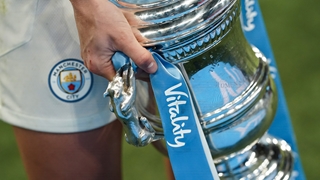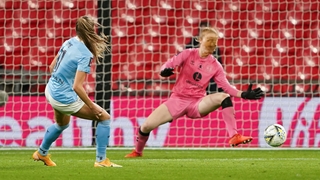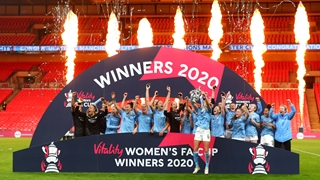
441 days, several months of nationwide quarantine, two transfer windows and a curtailed league season. Yesterday, the waiting was finally over.
Over a year following the dawn of the 50th runout of the Women’s FA Cup, the most protracted, atypical, disrupted tournament of them all finally a saw champion crowned on a chilly afternoon at Wembley. Not in half a century had English football been made to wait so long for a winner – nor had the world around it witnessed such upheaval in the interim – and yet, in this most unusual of seasons, there remains perhaps nothing left completely untouched by allegory.
Sunday’s final served as an almost parabolic homage to the continuing unpredictability that has reigned over football since March. Set-piece disasters, stoppage time woodwork-shattering efforts, a performance of profound goalkeeping inspiration courtesy of Sandy MacIver, and the lionhearted sight of a visibly-not-fully-fit Valerie Gauvin toiling into the dying of the embers of the 90 made for a spectacle of opulent, if not at times wonderfully erratic entertainment. And at the end of it all, in some wisecrack gag laid on by the footballing gods, another half an hour. Extra time extended to six months and thirty minutes, just in case supporter anticipation hadn’t quite had the chance to spike.
Ultimately, it was Manchester City that would emerge triumphant; Georgia Stanway breaking clear of the Everton backline and sliding the ball past MacIver to make it 1-2 with less than ten minutes to play, before Janine Beckie put matters beyond doubt as the Toffees desperately chased an equaliser. For the third time in four years, City would be guardians of the FA Cup, but not without the prevailing sense that this may be the sweetest of the bunch. Certainly, the most taxing victory of them all.
It has been over nine months since the club made their bow in what is now last season’s instalment of this competition, beating Manchester United 3-2 in a thrilling crosstown derby. Since then, however, there have been few constants. A promising league campaign cut short by the pandemic, and a squad so lightweight that manager Gareth Taylor admitted to “struggling to fill the bench” during their Community Shield loss against Chelsea once women's football returned in August. Yet Taylor, who himself only took charge of first-team affairs in May, was quick to praise his team’s “will and desire” in the aftermath of yesterday’s victory, as well as insisting they had “they had proved their true colours” mentally by delivering such a critical a victory in exceptionally testing circumstances.
The strength of the mentality of which Taylor speaks has no doubt been aided by the success of his recently-arrived, low-cost, high-quality American imports Sam Mewis and Rose Lavelle, as well as the battle-hardened Lucy Bronze and Alex Greenwood from Lyon. In the aftermath of yesterday’s match, Taylor singled out Mewis, scorer of City’s first goal, lauding “the effect she’s had on younger players like Jess Park” and hailing her as “someone who’s going to drag the team along with her.”
Despite such appraisal in the direction of his group, however, Taylor will hope that Sunday’s final proves to be something of a turning point in City’s season. Their start to the WSL campaign has been mixed, recording disappointing draws against Brighton & Hove Albion and Reading, as well as a 3-1 loss to Chelsea, already leaving them four points worse off than at this stage last season. Nevertheless, Taylor believes that yesterday’s win could provide a “springboard” for the rest of the season, as the club chase a first league title since 2016.
Certainly, elements of Sunday’s performance may serve as a strongly-worded letter of intent sent in the direction of the likes of Chelsea and Arsenal. Mewis, Greenwood and substitute Stanway together demonstrated all the hallmarks of a robust footballing spine, showing a resilience at crucial moments that has often been thus far absent in City’s season, whilst the marauding Demi Stokes and the seemingly-tireless industry of Chloe Kelly were constant sources of creativity over the course of two hours.
Yet City’s celebrations at full-time, played out in front an all but empty Wembley Stadium, came as a timely reminder of the stark context that surrounded yesterday’s match. Earlier, Emily Haig had performed what may have under normal circumstances have been a stirring rendition of God Save the Queen. On this occasion, however, it fell less on deaf ears and more on close to no ears at all. It had been a long time coming, but this was an FA Cup final with a difference. No roar of relief at the final whistle, no accompanying pandemonium in the stands. In a few hours’ time Euston Station would remain largely empty, no jubilant trains back to Manchester Piccadilly this time. On the surface, at least, this was Shostakovich’s 1st with no violin, Garfunkel without Simon.
And yet, in times as difficult as these, occasions like this retain perhaps an even more considerable significance than previously. The City of Manchester, over the past few weeks, has been amongst the places hardest hit in Britain by the Coronavirus pandemic. Placed into regional lockdown, and now faced with the prospect of at least another month with crippling restrictions on daily life, the sense of community and local pride in the area has become more important than ever.
The increasingly important connection between the community and the football club is something Taylor spoke about proudly after yesterday’s match. “When we came into the dressing room today, (we saw) the messages of support, the TV screens were on with all the supporters at home. It was just amazing. Hopefully we can continue to give them things to be happy about.” Taylor’s message is clear. In “tough times”, as he described them, it is more important than ever for football clubs to give back to the communities which they represent.
It is a message, undoubtedly, which extends far beyond Sunday’s match. As the rest of society grinds to another gruelling halt, football continues to do its best to prove that it is asymptomatic of the events surrounding it. For local communities up and down Britain, elite sport continues to provide the sort of escapism for which it has always been a standard-bearer. Football finds itself instilling both pride and pleasure into communities which continue to suffer from the hardship of COVID-19. Manchester City’s FA Cup win, more than a year in the making, is proof of just that.










